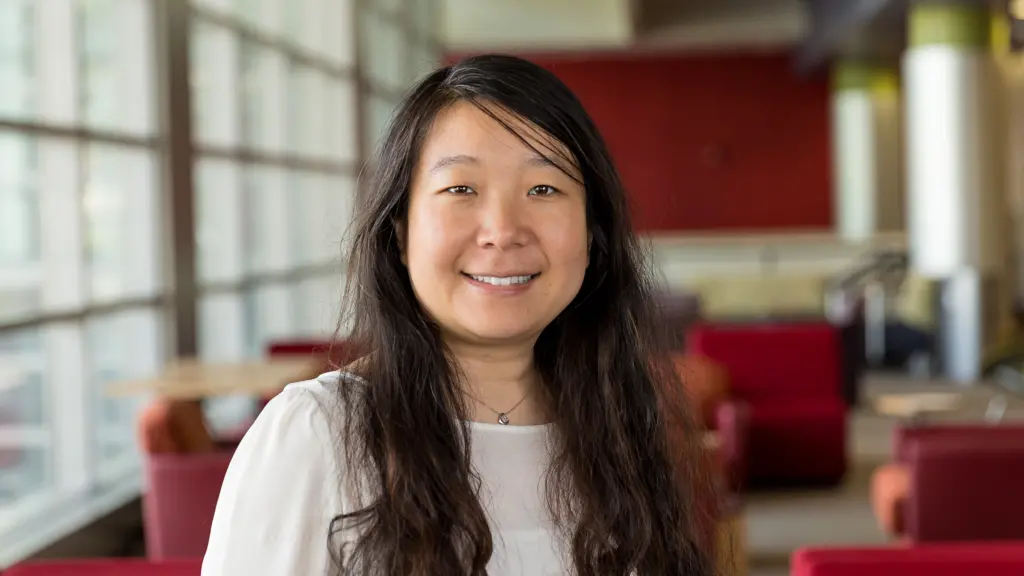Silicon transistors have made the modern electronics world possible over the last 50 years. In the next few decades, processors will need a new technology to improve computing power and efficiency. The leading candidate is quantum computing, in which just a few hundred quantum bits, or qubits, can outperform billions of silicon transistors.
The problem is that researchers have yet to identify the ideal “recipe” for qubits. In fact, characterizing these quantum materials, where complex interactions take place on the atomic and subatomic level, requires powerful and sophisticated computational and theoretical tools. That’s what Associate Professor Yuan Ping, who joined the faculty in July 2023, is bringing to the Department of Materials Science and Engineering at the University of Wisconsin-Madison.
“I have developed a whole lot of theory based on quantum mechanics in the past years which is useful for studying optoelectronics, spintronics and spin qubits,” says Yuan, who also has joint appointments in physics and chemistry. “Our goal is to develop new theory and code to predict the materials that are good for these types of applications.”
Yuan received her bachelor’s degree from the University of Science and Technology of China in 2007 before earning her PhD from the University of California, Davis, in 2013. Beginning in 2013, she served as a materials postdoctoral fellow at the California Institute of Technology in Pasadena before joining the University of California, Santa Cruz, in 2016 as an assistant professor of chemistry and an affiliated professor of physics. Since then, she has already amassed a number of impressive honors, including promotion to associate professor, a National Science Foundation CAREER award, an Alfred Sloan Research fellowship, an Air Force Young Investigator Program award, and a Department of Energy Computational Chemistry Science Award, among others.
Early in her career, Ping conducted fundamental theoretical work on solid state materials for solar energy applications. But in 2016, amidst a national call for more research in quantum information science, she shifted her focus to quantum materials for quantum computing.
She also studies spin chemistry, looking at the ways “spin,” a quantum property of electrons, can impact catalysis and photochemistry.
“We work from first principles to develop new theory and code to look at the behavior, dynamics and decoherence, or loss of information, of the spin state,” says Ping. “Then we try to reach out to experimentalists who can validate these calculations and can actually make these materials.”
UW-Madison, she says, is an ideal place for these types of collaborations, and she is excited to work with researchers in the UW-Madison Quantum Institute, the NSF-funded Materials Research Science and Engineering Center, the Theoretical Chemistry Institute and throughout the College of Engineering, physics, chemistry, and across the university. In fact, she might have more collaborators than she can handle. “While visiting, I found campus actually needs someone like me urgently—someone with a broad background in solid state physics, chemistry, and materials science, and this type of materials theory,” she says.
The “first-principles” tools her group develops and employs will provide direct atomistic level information of materials, without the need of prior inputs, which can be compared to experiments and guide experimental synthesis. “In the general area of quantum materials, they need people from all sides—experimental and theoretical. I think it’s a good fit and l’ll be able to make a bigger impact on this campus through my interdisciplinary research.”
Yuan says she’s excited to start at Madison, as are the members of her lab, including four graduate students and one postdoc who have moved to UW-Madison as well. And though she spent the last 15 years in California, she says she’s ready for Wisconsin winters. “I grew up in the north of China, where the weather is not that different from Madison,” she says. “So there will be some adjustment and memories from when I was a child. And I love the four seasons.”
Featured photo by Joel Hallberg
